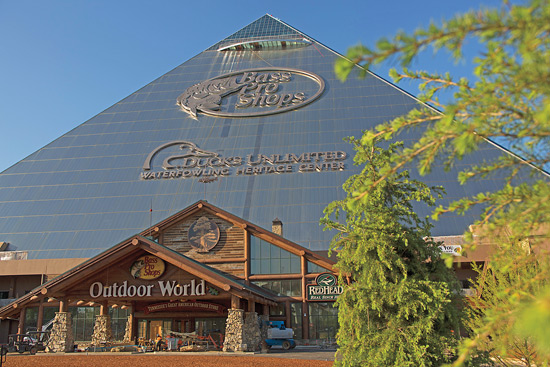Ducks Unlimited's New Waterfowling Heritage Center
Inside Bass Pro Shops' mighty superstore in the Memphis Pyramid is a treasury of duck hunting history and memorabilia
Inside Bass Pro Shops' mighty superstore in the Memphis Pyramid is a treasury of duck hunting history and memorabilia

By Gary Koehler
On the first Saturday following the grand opening extravaganza of the Bass Pro Shops at the Memphis Pyramid in late April, more than 5,700 people flocked to the Ducks Unlimited Waterfowling Heritage Center. Curator Katie Burke and other DU staff members were on hand to greet visitors and answer questions.
"The shotguns have gotten a lot of attention," Burke says. "And so has the duck call collection. I can tell by all the fingerprints on the glass display cases." She laughs as she points out the telltale signs of the exhibit's popularity-dozens of smudged fingerprints and perhaps a nose print or two on the glass panes.
Three years of planning and development resulted in the creation of the Waterfowling Heritage Center, an extraordinary interactive museum designed to raise awareness of wetlands and waterfowl conservation, emphasize the importance of rivers and wetlands to society, and illustrate the role that hunters play in conserving wildlife habitat and the waterfowl resource.

"Ducks Unlimited is thrilled to partner with Bass Pro Shops in bringing the Waterfowling Heritage Center to life," says Ducks Unlimited CEO Dale Hall. "The center plays a large part in honoring our hunting and conservation heritage, while also educating Bass Pro Shops guests about DU's vision of wetlands sufficient to fill the skies with waterfowl today, tomorrow, and forever. And with both the Bass Pro Shops and DU Waterfowling Heritage Center logos gracing the south side of the Pyramid, this partnership will be a tremendous boost to public awareness of our brand and mission."
The Waterfowling Heritage Center encompasses 4,600 square feet of space on the second floor of the Memphis Bass Pro Shops at the Pyramid retail store. The prime space and all the display cases were generously donated by Bass Pro Shops at no cost to DU. Among the five featured exhibits are the Ducks Unlimited Story, which tracks the 78-year history of DU and its unmatched corps of volunteers, now 55,000 strong nationwide; an area devoted to explaining how and where vital waterfowl habitat is being conserved; a celebration of the history of waterfowling from the Native American and colonial eras all the way to present times; the Lodge, a place where visitors can relax and watch videos and view artwork, taxidermy, and waterfowl artifacts; and the Duck Blind, where one can experience Arkansas timber duck hunting via video and a simulated Laser Shot duck hunting game.
"We're honored to have expanded our long-term partnership with North America's premier wetlands and waterfowl conservation organization to create the Ducks Unlimited Waterfowling Heritage Center," said Bass Pro Shops founder Johnny Morris. "Being able to help celebrate the remarkable positive impact DU has had on conservation worldwide is something we're proud of, and we're excited about the center's ability to provide an exciting, interactive conservation experience for families."
The Waterfowling Heritage Center is more of an educational venue than a simple tour of all things tied to duckdom. There is plenty to see and do here, whether you're a new or veteran duck hunter or someone who is simply curious about our nation's waterfowling history and the evolution of DU's renowned wetlands and waterfowl conservation programs and would like to learn more. The state-of-the-art, hands-on facility features waterfowl identification kiosks, which provide information about North America's ducks, geese, and other waterfowl with the touch of a button. Another multimedia panel celebrates the retriever's role as both hunting partner and conservationist.
"The duck species kiosks have been extremely popular," Burke says. "They always seem to have people around them. Our visitors are really interested in learning about the birds that they hunt or observe in the wild. These kiosks have really gotten a workout from day one."
Touch-screen monitors deliver an important conservation message by showing where and how DU conserves habitat. The conservation section is also enhanced by a model that clearly illustrates the broader importance of wetlands by demonstrating how a wetland can absorb water to help prevent potential flooding. A second model depicts the adverse effects that wetland drainage has on people and wildlife.
Other displays highlight the fact that DU has always been about wetlands and waterfowl conservation. There's an interactive timeline illustrating the organization's history through photography, historical documents, videos, and vignettes. Original paintings bear testament to DU's longstanding wildlife art program and another exhibit showcases the organization's extensive memorabilia collection. "This section is important because it gives a clear look at where DU has been and where it is now," Burke says. "It has everything from historical photographs to new items that are available only through the DU event system."
At 535,000 square feet, the Bass Pro Shops at the Pyramid in Memphis is the largest store of its kind in the world. But the sheer enormity of the building may be over- shadowed by its contents. Hard to believe? Just walk in the door and look around. This place offers a jaw-dropping array of amenities seldom-if ever-seen under one roof. Designers pulled out all the stops in building not only a superstore, but also a destination worthy of listing atop the Eight Wonders of the Outdoor World.
Credit Bass Pro Shops founder Johnny Morris and his staff with creating the outdoorsman's ultimate one-stop shopping experience. With everything from fishing tackle, boats, and sunglasses to clothing, firearms, and ATVs, the inventory is staggering. If you can't find the outdoor product you are looking for here, it might not exist.
The Pyramid, the largest of Bass Pro Shops' 72 stores, is expected to attract up to 2 million visitors each year. The entire place is awash in wow factor. Have you ever seen a cypress swamp indoors? Look no further. How about a pit with live alligators? This Bass Pro has one, along with nearly 600,000 gallons of water features, including multiple aquariums. It also has the world's tallest freestanding elevator, which rises 28 stories in the center of the Pyramid. A glass elevator ride brings you to The Lookout, which features a restaurant, bar, and observation deck from which you can take in a panoramic view of the city and surrounding area. There's Uncle Buck's Fish Bowl and Grill, a combination restaurant and 13-lane bowling alley. Pistol and archery ranges offer fun for the whole family. More than 1,000 wildlife mounts provide a natural history tour indoors. And if you can't take in everything in one day, there's the option of staying the night at the 103-room Big Cypress Lodge hotel.
While DU is proud of its conservation heritage, the organization has also long celebrated the traditions and gear common to waterfowl hunting. Individuals with an interest in vintage decoys will have a field day at the Waterfowling Heritage Center. Be prepared to spend some time viewing a massive flock of historically significant decoys courtesy of Memphis native Paul Tudor Jones II. These decoys, which represent a portion of one of the world's foremost collections, feature the works of many of the nation's most highly regarded carvers. The handmade decoys date from 1850 to 1950 and highlight the skilled craftsmanship involved in this truly American folk art. Additional decoy displays include a large number of vintage factory birds as well as an eye-popping selection of contemporary waterfowl carvings from the Doug Miller collection.
Duck calls have for generations been an integral part of waterfowling as well. The center proudly displays 125 different duck calls on loan from the collection of game-call historian and author Howard Harlan. These outstanding examples of the handiwork of many Mississippi Flyway call makers date from the 1800s to modern times.
And then there are the gun displays that Burke singled out as being the focus of visitor appreciation. When was the last time you saw a punt gun or a battery gun up close and personal? These vintage firearms, once used by market gunners a hundred years ago, are just the start. Shoulder-fired big-bore shotguns from years long past and present-day DU "dinner guns" are among the wide range of firearms featured in these diverse collections.
The exhibit's numerous duck mounts have also had quite an audience. "I enjoy watching people discover the taxidermy," Burke says. "Folks will walk by, then turn around and check out some of the birds that they may not have seen immediately. There are many mounts to see, each one more interesting than the last. I'm sure the taxidermy is going to continue to be a big hit."
The Waterfowling Heritage Center is open during regular store hours. Admission is free. School and other group tours are also available. How can you be sure you are at the correct building? Just look for the largest DU logo in the world-132 feet long and 48 feet high-on the south face of the Bass Pro Shops at the Pyramid in Memphis. You can't miss it.
Ducks Unlimited uses cookies to enhance your browsing experience, optimize site functionality, analyze traffic, and deliver personalized advertising through third parties. By continuing to use this site, you agree to our use of cookies. View Privacy Policy